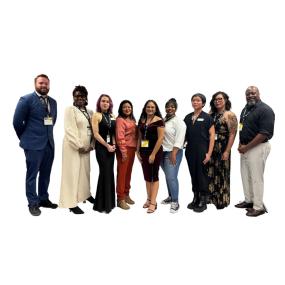Community Compensation Guidelines
Removing barriers to co-creating policies with Community.


Welcome!
Welcome to the Community Compensation page! We are excited to share important information about how to engage with communities across Washington State. Community members play a significant role in shaping public policy, and now Washington has a way to provide compensation to our valued volunteers.
At the heart of this platform is Senate Bill 5793 (SB 5793), the innovative legislation that directs state agencies to compensate individuals who participate in state-hosted workgroups and have been left out of policy discussions. This includes those impacted by the foster care system, housing insecurity, and the justice system. We deeply value the insights of individuals who have direct experience with the various challenges, as they offer critical perspectives on how state policies impact real lives.
Make sure to take a look at our updated Community Compensation Guidelines.
Why Do the "Community Compensation Guidelines" Exist?
Our philosophy behind the Community Compensation Guidelines is rooted in the belief that all government actions that impact people must actively involve the individuals who are most impacted. Too often, those who have lived through life challenges, such as poverty and homelessness, are left out of the decision-making process. We aim to eliminate barriers to participation and recognize the immense value you bring to state government workgroups. We believe in collaboration— when individuals with lived experience can co-create with government officials to develop policies and solutions, we foster an environment of trust and partnership. By moving from a transactional (give and take) to a relational culture (an environment built on trust), we are ensuring that policies are better informed, equitable, and effective in meeting the needs of the people they aim to serve.
For Community Members
Are you a Washington state resident with firsthand experience who wants to drive meaningful change in state government? We want to hear from you! A Class One workgroup is a temporary advisory group formed to evaluate specific issues or provide recommendations to state government agencies. Class One Workgroups, made up of community members across the state, are essential to co-creating policies that reflect the needs of the people, not just government systems.
We understand that communities have been hurt in the past because they were ignored, not paid for their contributions, and their real-life experiences weren’t acknowledged. That’s why Senate Bill 5793 , in tandem with Second Engrossed Second Substitute House Bill 1541 (a law that makes sure that community members who have gone through certain struggles or challenges are included in making decisions on policies that affect them), ensures that you are not only compensated for your time and input, but that your time and experiences are valued. This legislation aims to level the playing field, creating pathways for people with lived experience to influence the policies that directly impact them.
Here, you will find resources, guides, and forms that will help you understand how to get involved with workgroups that state agencies are putting together. Please be aware that the Community Compensation Guidelines apply specifically to Class One Workgroups, which are set up by state agencies to consult and collaborate with community members like you.
Guidance for State Agencies
The Office of Equity has developed more tools and resources for state agencies to help them effectively navigate the process of engaging with and compensating community volunteers. These resources include Volume 2 of the Community Compensation Guidelines, examples of guidelines from different agencies, updated forms and templates, best practices, and a Community Engagement Toolkit to help agency staff create meaningful, intentional, and inclusive interactions with community members. Agencies should review the Community Compensation Request and Reporting Form, along with the Allocation Best Practices document, to gain an understanding of what in formation is needed and a step-by-step process for submission.
Other documents you might find helpful:
- Individual Invoice Template
- Recording Release Template
- Stipend Eligibility Attestation Form Template
- Volunteer Acknowledgement Form Template
- ACH Authorization Template
- 1.02 Private Local Funds Policy
- Volunteer Acknowledgement Form_v2.docx
- Stipend Request Form.docx
- External 5793 Reimbursement Tracking Form.xlsx
- Relational Partnership Workbook
- Senate Bill 5793 Report
Below is a list of deadlines for quarterly reports (for more information, see Allocation Best Practices & Community Compensation Request and Reporting Form):

Legislative Reports
The legislative reports on Community Compensation, completed in November 2024, provide a comprehensive overview of data collected from state employees and volunteers. The reports include feedback from participants regarding current compensation practices and highlight areas for improvement. Both the short and long versions offer detailed insights into the process, along with actionable suggestions aimed at enhancing the overall compensation structure. These reports serve as a valuable tool for refining compensation policies and ensuring they better meet the needs of those involved.
- Community Compensation Legislative Report 2024 – Extended Version
- Community Compensation Legislative Report 2024 – Summarized Version
Examples from Other State Agencies
Are you an employee of a state agency looking for examples of making specific processes for your agency to start compensating community members? Check out these resources we have collected.
*Please note that each agency has its own policies and practices regarding document accessibility and may not match the accessibility of the Office of Equity's documents.
Washington State Department of Social and Health Services (DSHS)
Department of Health (DOH)
Department of Fish and Wildlife (DFW)
Department of Commerce (COM)
- COM POL 100-03-001 Compensating Community Members.pdf
- COM Compensating Community Members Procedures.pdf
- COM Community Compensation Self-Attestation Template COM.docx
- Stipend Request Form Template COM_0.docx
- Recording Release Form COM.docx
- SWV Compensation Template COM.xlsx
Department of Corrections (DOC)
- DOC Group Chairperson Guidelines - 5-3-2024.pdf
- DOC - Community Member Onboarding and Orientation Guide - 5-3-2024.pdf
- DOC - Community Member Compensation Request.pdf
- DOC - Community Compensation Program Member Acknowledgment.pdf
- DOC - Community Compensation Program Disbursements Internal Process.pdf
- DOC - Community Compensation Program Application.pdf
- DOC - Community Compensation Program - Other Statutory Duties Template.docx
- DOC - Community Compensation Program – Other Statutory Duties Process.pdf
- DOC - Community Compensation Program - In-Person Attendance Roster.docx
- DOC - Community Compensation Program – Attendance Report Internal Process.pdf
Accessibility Notes
We urge agencies and state employees managing Community Compensation for members of the public to keep in mind the needs of the public. If a state agency asks a community member to complete the paperwork for compensation, please ensure that all documents you provide are accessible.
This includes but is not limited to documents with good contrast between the text and background, alt text for meaningful images, and access methods that are screen-reader friendly. When an agency develops paperwork, it can expect to share this with a large audience, and accessibility is required. For more about state accessibility standards, please see Accessibility Policy | WaTech. State employees may find trainings in the Learning Center regarding document and webpage accessibility to be helpful.
We encourage whoever manages the process to continue to offer that people may make requests in languages other than English, and in alternate formats, such as large print or Braille. Building your Community Compensation process is best done in conjunction with your agency's equity processes regarding language access, disability access, and digital accessibility.
We are excited to work with you all as we move forward in creating policies that honor and respect the experiences of our communities. Thank you for being part of this important effort!
If you have any questions, comments, or concerns, please don’t hesitate to reach out to us via email at LivedExperience@equity.wa.gov. Have requests for information in another language or format? Email us at access@equity.wa.gov. See our Accessibility pages or FAQ page for more details, which are always linked in the footer (at the bottom of our website).

